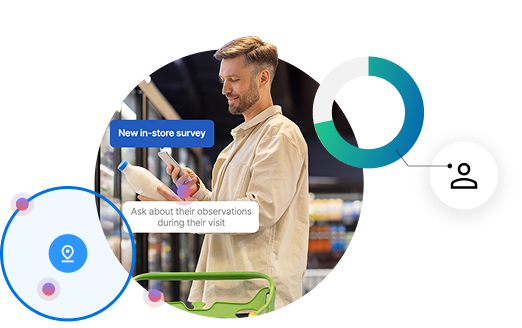In today’s rapidly evolving business landscape, data-driven decision-making is no longer a luxury; it’s a necessity. And for companies looking to gain a competitive edge, survey software has become an invaluable tool. By using survey software, businesses can uncover invaluable insights that drive strategy and inform decision-making.
Surveys provide a direct line to the thoughts, opinions, and preferences of customers, employees, or any target audience. This enables organizations to gain a deeper understanding of their needs, pain points, and expectations. But it’s not just about gathering data; it’s about turning that data into actionable insights that drive results.
With the right survey software, businesses can easily design, distribute, and analyze surveys, providing them with the power to make informed decisions and identify trends that may have otherwise gone unnoticed. From market research to customer feedback and employee engagement, survey software offers a versatile toolbox for gathering the information needed to stay ahead of the curve.
In this article, we will explore the untapped potential of survey software and how it can unlock actionable insights that drive meaningful business outcomes.
Benefits of using survey software
Survey software offers a wide range of benefits for businesses of all sizes and industries. Whether you’re a small startup or a multinational corporation, leveraging survey software can provide you with a competitive advantage.
First and foremost, survey software streamlines the entire survey process. Traditional methods of data collection, such as paper surveys or phone interviews, can be time-consuming and resource-intensive. Survey software eliminates these inefficiencies, allowing you to design, distribute, and collect responses in a matter of minutes. The automated nature of survey software saves both time and money, making it an attractive solution for businesses on a tight budget.
Secondly, survey software offers unparalleled scalability. Regardless of the size of your target audience, survey software can handle the volume of responses with ease. This scalability is crucial for businesses that need to collect data from a large sample size or conduct surveys on a regular basis. With survey software, you can gather insights from hundreds, thousands, or even millions of respondents, giving you a comprehensive understanding of your target audience.
Furthermore, the right survey survey software provides real-time data analysis. Once responses start pouring in, survey software allows you to analyze the data in real-time. This instant feedback enables you to spot trends, identify patterns, and make data-driven decisions on the fly. With traditional data collection methods, you would have to wait days or even weeks for the data to be processed and analyzed. Survey software eliminates this lag time, empowering you to take immediate action based on the insights you gather.
In summary, the benefits of using survey software are numerous. It saves time and money, offers scalability, and provides real-time data analysis. By leveraging survey software, businesses can make informed decisions, identify trends, and stay ahead of the competition.
Types of surveys you can create with survey software
Survey software offers a wide range of survey types that cater to different business needs and objectives. Whether you’re looking to gather customer feedback, conduct market research, or measure employee satisfaction, survey software has you covered.
One of the most common survey types is the customer satisfaction survey. These surveys are designed to gauge a customer’s level of satisfaction with a product, service, or overall experience. Customer satisfaction surveys typically consist of questions that measure satisfaction levels, identify areas for improvement, and gather additional feedback. With survey software, you can easily create and distribute customer satisfaction surveys to gain valuable insights into your customers’ experiences.
Another popular survey type is the market research survey. Market research surveys help businesses understand their target market, identify potential customers, and gather insights that drive marketing strategies. These surveys often include questions about demographics, purchasing behavior, and preferences. Survey software allows you to reach a large sample size and analyze the data to uncover market trends and consumer preferences.
Employee engagement surveys are also commonly used in organizations to measure employee satisfaction, identify areas for improvement, and boost employee morale. These surveys typically include questions about job satisfaction, work-life balance, and communication within the organization. With survey software, you can create and distribute employee engagement surveys to gain valuable insights into your company’s culture and improve employee satisfaction.
In addition to these survey types, survey software offers a variety of other survey options, including event feedback surveys, product feedback surveys, and website feedback surveys. The flexibility of survey software allows businesses to tailor their surveys to their specific needs and objectives.
Tips for designing effective surveys
Designing effective surveys is crucial to gathering accurate and actionable insights. Poorly designed surveys can lead to biased responses, low response rates, and unreliable data. To ensure the success of your surveys, consider the following tips:
- Define your objectives: Before designing your survey, clearly define your objectives and the insights you hope to gather. This will help you structure your survey and ask the right questions.
- Keep it concise: Long, complex surveys can be overwhelming for respondents and lead to drop-offs. Keep your survey concise and focused on the key areas you want to explore.
- Use clear and simple language: Avoid jargon, technical terms, or complex language that may confuse respondents. Use clear and simple language that is easy to understand.
- Ask one question at a time: Avoid double-barreled questions that ask two things at once. Instead, break down complex questions into separate, single-focused questions.
- Offer a variety of question types: Mix up your question types to keep respondents engaged. Use multiple-choice, rating scales, open-ended, and other question formats to gather different types of data.
- Avoid leading or biased questions: Ensure your questions are neutral and unbiased. Leading questions can manipulate respondents into providing a specific answer, skewing the data.
- Test your survey: Before distributing your survey, test it with a small group of respondents to identify any issues or areas for improvement. This will help you fine-tune your survey before launching it on a larger scale.
By following these tips, you can design surveys that are engaging, effective, and provide you with the insights you need to make informed decisions.
Some platforms like MFour Studio have an AI DIY tool built in so you can build professional surveys in seconds.
Collecting and analyzing survey data
Collecting and analyzing survey data is a critical step in unlocking actionable insights. Once you’ve distributed your survey and gathered responses, it’s time to analyze the data to uncover patterns, trends, and actionable insights.
Survey software simplifies the data collection process by automatically aggregating and organizing responses. Instead of manually entering data from paper surveys or transcribing phone interviews, survey software streamlines the entire process. This not only saves time but also reduces the risk of human error.
Once the data is collected, survey software provides a range of tools and features to analyze the data effectively. These tools allow you to filter and segment responses, calculate averages and percentages, and visualize data through charts and graphs. With survey software, you can easily identify trends, compare responses across different demographics, and uncover insights that drive strategy.
When analyzing survey data, it’s essential to look for patterns and correlations. Are there any common themes or trends that emerge from the responses? Are there any notable differences in responses based on demographics or other factors? By identifying patterns and correlations, you can gain a deeper understanding of your target audience and make data-driven decisions.
In addition to analyzing the data, it’s crucial to share the insights with key stakeholders in your organization. Survey software allows you to generate reports and presentations that communicate the findings effectively. By sharing the insights with decision-makers, you can drive meaningful change and improve business outcomes.
Using survey software for market research
Market research is a vital component of any business strategy. It helps businesses understand their target market, identify customer needs, and develop effective marketing strategies. Survey software provides a powerful platform for conducting market research and gathering insights that inform marketing decisions.
With survey software, you can easily reach a large sample size and collect data from a diverse range of respondents. This enables you to gather insights from your target market and make data-driven decisions that resonate with your customers.
Market research surveys can cover a wide range of topics, including customer preferences, purchasing behavior, brand perception, and competitor analysis. By leveraging survey software, you can design surveys that explore these areas and gather valuable insights into your market.
One of the key advantages of using survey software for market research is the ability to collect real-time data. Traditional market research methods, such as focus groups or in-person interviews, can be time-consuming and slow. Survey software allows you to collect data from a large sample size in a short period, providing you with real-time insights into your market.
Furthermore, survey software offers advanced analytics features that help you analyze market research data effectively. These features allow you to segment responses, compare data across different demographics, and identify trends and patterns. By analyzing the data, you can gain a deep understanding of your target market and develop targeted marketing strategies.
By leveraging survey software for market research, businesses can gather reliable insights, make data-driven decisions, and stay ahead of the competition.
Incorporating surveys into customer feedback strategies
Customer feedback is a goldmine of insights that can drive business growth and improve customer satisfaction. Surveys provide a direct line of communication with your customers, enabling you to gather feedback, measure satisfaction levels, and identify areas for improvement.
Survey software offers a variety of tools and features that help businesses incorporate surveys into their customer feedback strategies. These tools allow you to design surveys that gather feedback at different touchpoints in the customer journey, such as after a purchase or interaction with customer support.
Customer feedback surveys can cover a wide range of topics, including product satisfaction, customer service experience, and brand perception. By leveraging survey software, you can create surveys that target specific areas of your business and gather insights that drive improvement.
In addition to gathering feedback, survey software allows businesses to automate follow-up actions based on survey responses. For example, if a customer indicates dissatisfaction with a product, survey software can trigger a support ticket or send a notification to the relevant team. This automation ensures that customer feedback is acted upon promptly, leading to improved customer satisfaction and loyalty.
Furthermore, survey software offers features that allow businesses to monitor customer satisfaction in real-time. These features provide dashboards and reports that track customer satisfaction metrics, such as Net Promoter Score (NPS) or Customer Satisfaction Score (CSAT). By monitoring these metrics, businesses can identify trends and take proactive steps to improve customer satisfaction.
Incorporating surveys into customer feedback strategies is essential for businesses that want to build strong customer relationships, improve products and services, and drive customer loyalty.
Integrating survey software with other tools and platforms
To maximize the value of survey data, businesses can integrate survey software with other tools and platforms. This integration allows for seamless data transfer, automation of workflows, and improved data analysis.
One common integration is with customer relationship management (CRM) software. By integrating survey software with CRM software, businesses can link survey responses to customer profiles, providing a holistic view of each customer. This integration enables businesses to personalize customer interactions, tailor marketing campaigns, and improve customer satisfaction.
Another valuable integration is with email marketing software. By integrating survey software with email marketing software, businesses can automate the distribution of surveys to their email subscribers. This integration ensures that surveys reach a wider audience and improves response rates. Additionally, survey responses can be used to segment email lists and personalize email content, resulting in more targeted and effective email marketing campaigns.
Furthermore, survey software can be integrated with project management tools to streamline workflows and automate processes. For example, if a survey response requires follow-up action, survey software can automatically create a task or notify the relevant team member through project management software. This integration ensures that survey data is acted upon promptly and improves overall efficiency.
Integrating survey software with other tools and platforms enhances the value and usability of survey data. By automating workflows, improving data analysis, and personalizing customer interactions, businesses can unlock the full potential of survey software.
Selecting the right survey software for your needs
Selecting the right survey software is crucial to ensure the success of your survey initiatives. With numerous options available in the market, it’s essential to consider your specific needs and objectives before making a decision.
When evaluating survey software, consider the following factors:
- Ease of use: Look for survey software that is user-friendly and intuitive. The ease of use will ensure that you can quickly design, distribute, and analyze surveys without the need for extensive training.
- Features and functionality: Assess the features and functionality offered by each survey software. Consider whether it meets your specific needs, such as advanced analytics, automation capabilities, or integration options.
- Scalability: Consider the scalability of the survey software. Can it handle the volume of responses you expect? Does it offer the flexibility to grow with your business?
- Data security: Ensure that the survey software you choose prioritizes data security and privacy. Look for features such as encryption, secure data storage, and compliance with privacy regulations.
- Customer support: Evaluate the level of customer support offered by the survey software provider. Will they be available to assist you if you encounter any issues or have questions?
- Price: Consider your budget and evaluate the pricing options offered by survey software providers. Look for a solution that offers a good balance between features and affordability.
By carefully evaluating these factors, you can select the survey software that best fits your needs and objectives.
Conclusion: Harnessing the power of actionable insights with survey software
In today’s data-driven business landscape, survey software has become an indispensable tool for gathering actionable insights. By using survey software, businesses can unlock a wealth of information that drives strategy, improves decision-making, and enhances customer satisfaction.
From customer feedback to market research and employee engagement, survey software offers a versatile toolbox for gathering the information needed to stay ahead of the curve. With the right survey software, businesses can easily design, distribute, and analyze surveys, providing them with the power to make informed decisions and identify trends that may have otherwise gone unnoticed.
By leveraging survey software, businesses can harness the power of actionable insights and drive meaningful business outcomes. So, if you’re looking to gain a competitive edge and make data-driven decisions, it’s time to unlock the power of survey software and start gathering the insights that will propel your business forward.
See how survey platforms like MFour Studio can help your business!




